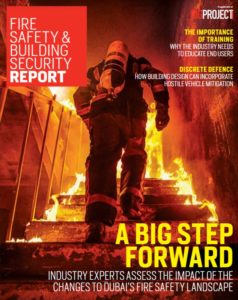Progression of Fire Safety in the UAE
 Prior to 2010, the UAE had limited fire regulations, the design of towers being dependent on the Building Code, and designer adoption of the National Fire Protection Association (NFPA) and International Building Contracting (IBC) guidelines. Due to recent tower fires, Dubai has been working towards adopting tougher fire regulations.
Prior to 2010, the UAE had limited fire regulations, the design of towers being dependent on the Building Code, and designer adoption of the National Fire Protection Association (NFPA) and International Building Contracting (IBC) guidelines. Due to recent tower fires, Dubai has been working towards adopting tougher fire regulations.
The revisions in the UAE’s 2013 Fire and Life Safety Code ensured fire-resistant cladding for new buildings over 15 metres tall; however, a considerable number of buildings in the region were constructed prior to stricter fire regulations. The 2015 high rise blazes in the Torch Tower and Address Hotel, both of which were completed prior to 2011, shifted focus back to the cladding used, as the type of insulation, fixings and voids behind the cladding contribute to the speed and intensity of the blazes.
The 2017 UAE Fire and Life Safety Code is a 1,426-page document, double that of 2011, providing detailed explanations of fire safety design elements, such as accessibility and cladding with respect to the various stakeholders that are held accountable. The code formulation team dedicated six months solely to setting the requirements for the cladding chapter.
With regard to the exterior cladding, the 2017 edition aims to raise the standards for supplement materials and reduce the cladding’s flammability to zero. Additionally, buildings completed prior to strict regulations must be audited individually to identify the risk specific to each building and must meet the new code requirements when it is time for their maintenance. There has been an increased focus on cladding as the main contributor to tower fires but there are a variety of other fire safety issues that must also be considered, including means of escape, lack of and damage to proper fire stopping meaning regular audits are essential.
Dubai has demonstrated timely responses to previous fire accidents, using modern fire prevention technology and qualified firefighters. Although the city has implemented smart systems and alarms, the building management control and on-going maintenance checks are factors that are often overlooked. According to Dubai Civil Defence, nine minutes is the average response time to fires in 2017, most of which were caused by faulty electric outlets or cigarette butts being thrown recklessly.
It is important for property owners and managers to take the necessary steps that emphasise the precautions that prevent a fire from starting. Some owners tend to ignore degrading areas in the building, basements, service floors, and roof tops which have been common start points for tower fires. Such issues can be avoided by a good facility management (FM) strategy that ensures the safety of residents. Frequent team replacements may lead to minor issues being ignored and fire safety plans falling by the wayside, thus it is important to develop a longstanding relationship with the FM team.
The UAE Ministry of Interior and Civil Defence Headquarters are launching the region’s largest automated integrated system of fire safety monitoring, which will connect all UAE buildings to improve emergency responses and regular maintenance activity. Dubai Civil Defence aims to position the UAE among the leading global countries in achieving safety and security. By following best practices in line with international standards, the UAE is shifting towards a community of enhanced life standards, with raised awareness of fire prevention and safety.
